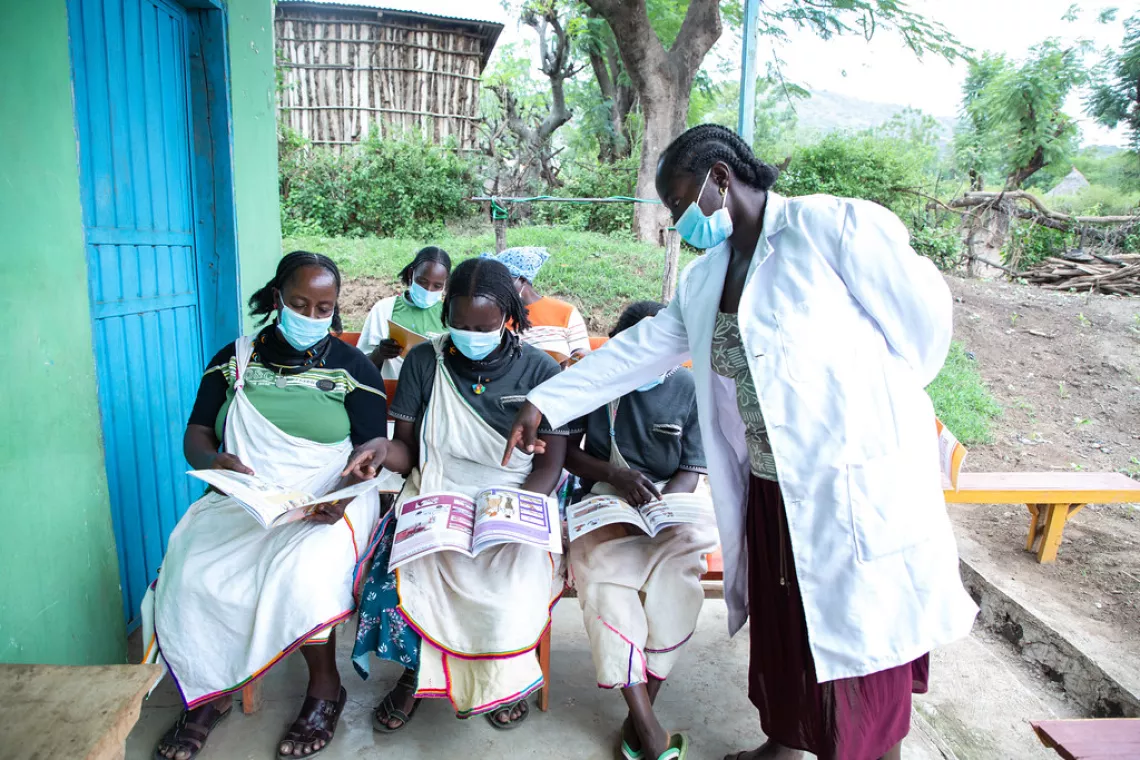Care for Life
reaching mothers and babies at the critical time and place

In Ethiopia, most maternal and newborn deaths occur during childbirth. Childbirth, a moment of joy and celebration often ends with tragedy. Neonatal conditions in Ethiopia account for 55 per cent of under-5 deaths, with 33 neonatal deaths occurring for every 1,000 live births. About 110,000 newborns die every year in the country. In addition, an equivalent number of stillbirths occur, representing a ‘silent epidemic’. More than 80 per cent of all newborn deaths result from three preventable and treatable conditions – complications due to prematurity, intrapartum-related deaths (including birth asphyxia), and neonatal infections[1].
To save more mothers and babies, especially in rural areas where hospital-based specialized health care services are not easily available, UNICEF is working with the Government of Ethiopia to enhance critical care under the continuum of care approach connecting essential maternal, newborn, and child health (MNCH) services, throughout adolescence, pregnancy, childbirth and postnatal. In the Southern Nations Nationalities and Peoples Region (SNNP), UNICEF with support from the Chinese Government trained and mentored health workers, equipped health facilities including hospitals with essential maternal and newborn supplies and equipment.
[1] Mini EDHS 2019

It all starts with health extension workers like Tigist Wolde in the villages. Health extension workers closely work with the women development army, who help identify pregnant women visiting each home in their respective neighbourhoods. These women groups have a one to five group network and one group leader. The women development army encourage pregnant women to visit health post as early as possible. They constantly meet with health extension workers and review progress on their work. According to Ethiopia’s community health system, a pregnant woman in rural areas is expected to do at least four antenatal visits at the time of her pregnancy. The first and last visit at health centres where more advanced services including laboratory and trained midwives are available while the rest two are done in health posts assisted by health extension workers.

Health extension workers also train members of the women development army on maternal, newborn and child health care with key messages focusing on identifying danger signs. These women teams are the main source of information helping pregnant women to prepare themselves for birth. They also help health extension workers to refer women for delivery in health facilities on time.

Pregnant women with high risk and those who live very far away from health facilities are encouraged to stay in maternity waiting homes -residential facilities located inside health centres or primary hospitals- so that they are closely followed up by skilled health care workers. According to WHO, maternity waiting homes help to "bridge the geographical gap" in obstetric care between rural areas, with poor access to equipped facilities, and urban areas where the services are available. [2] They also offer a low-cost way to bring women closer to needed obstetric care.

Immediately after birth, infection prevention measures such as eye care and cord care are critical. The newborn baby needs to keep warm and dry to test the first food for life, his/her mother's breast milk.
Yet, not all babies are born in normal circumstances. Quite a number of babies in rural Ethiopia, like Atalelech Washero are born prematurely and need special attention. “It is critical that we follow up on her temperature, pulse rate, blood oxygen saturation levels, and fluid intake. Since she was born prematurely, she is susceptible to infection,” says nurse Genzebe Mengesha while checking her temperature.

With support from the Government of China, in SNNP, UNICEF supports rural hospitals by providing critical equipment in neonatal intensive care units. “These equipment are essential for our work,” says Tsedeke Sintayehu, a trained neonatologist nurse working in Gidole hospital. “We are doing our best to save as many babies as we can despite all the challenges.”

Three days old twins Bikila and Kanawaka were born prematurely and referred to Gidole Primary Hospital’s Neonatal Intensive Care Unit (NICU). The next few days are critical for their survival and they are also responding well to their treatment. Gidole hospital is one of the busiest in SNNP. Many referral cases of specialized newborn care come to this hospital from adjacent woredas(districts). The complication of prematurity has become the major cause of deaths after admission to NICU, which requires additional high-tech equipment to upgrade the services of the NICU and specialized physicians. In addition, the delay of referral and lacks of escorting and life-saving support during the referral are the major causes of death.

With regular visits to health facilities, the UNICEF team also monitors progress and on newborn care and survival rates. This helps to identify challenges, discuss and craft local solutions and improve the quality of service provisions.


After the mother and baby are discharged from a hospital or a health centre, Health Extension workers like Azalech do a post-natal follow-up at home. This is a crucial step to identify and treat neonatal infections and killer childhood illnesses like pneumonia and diarrhoea. Health Extension Workers also teach mothers to identify critical signs of illnesses on their babies so that they bring them early for treatment. They also make sure that babies are not missing out on their immunization.
Katata Kedir is happy that she is visited regularly by Azalech to make sure that her month-old baby Boy Tesemaw is growing healthy. She closely follows the lessons looking at the illustrations from a family health guidebook which she keeps a copy in her house. “My boy is healthy, thanks Azalech and her colleagues. They came here and check his temperature and asks me if he is breastfeeding well,” says Katata.





